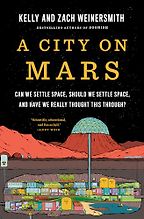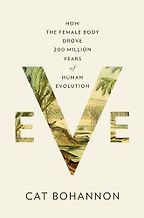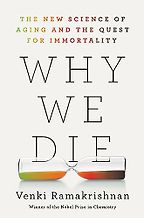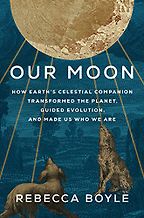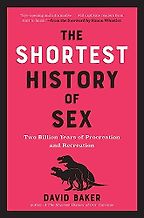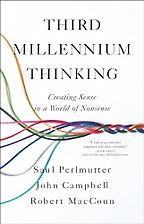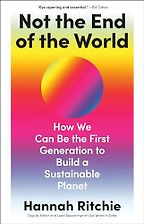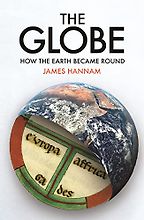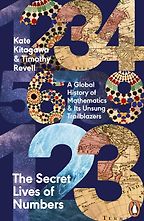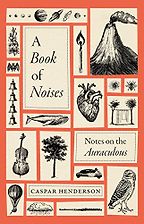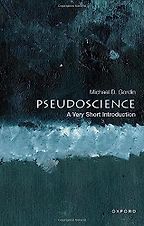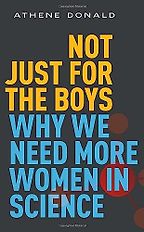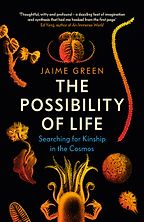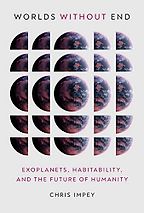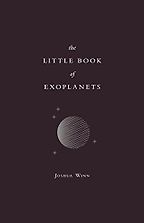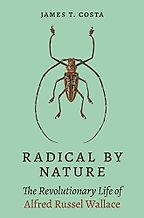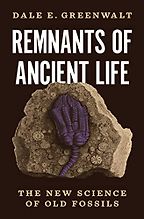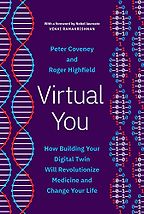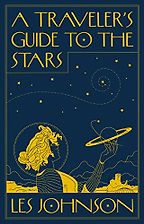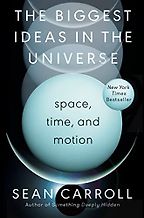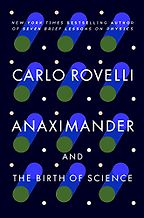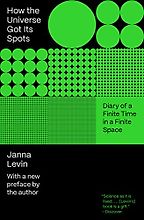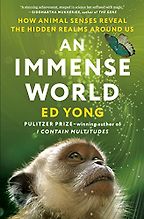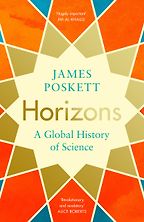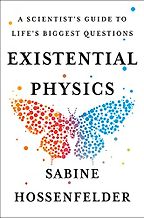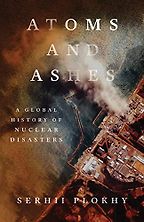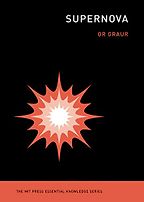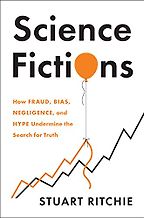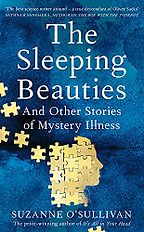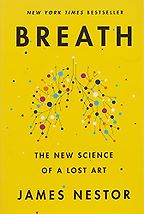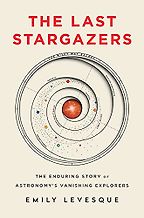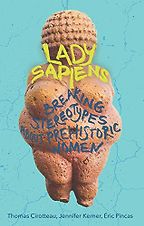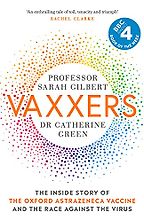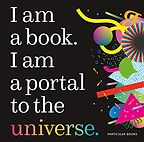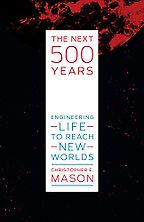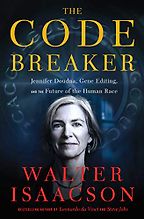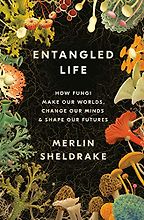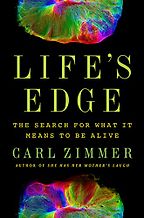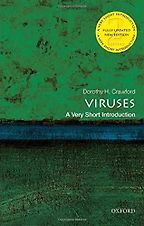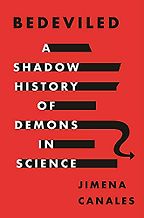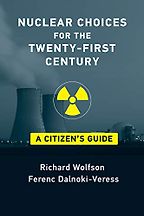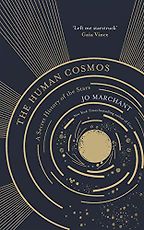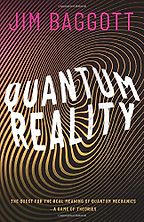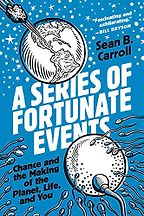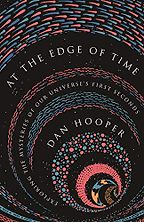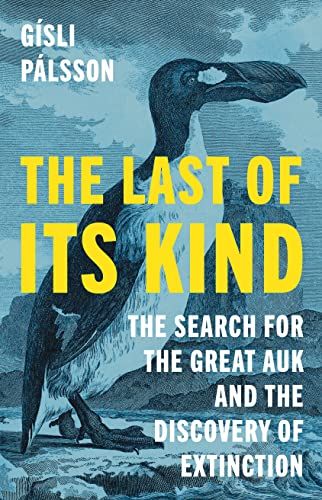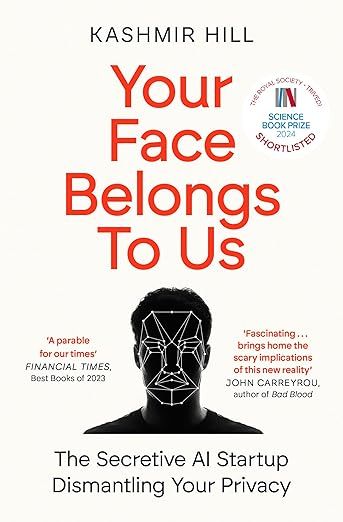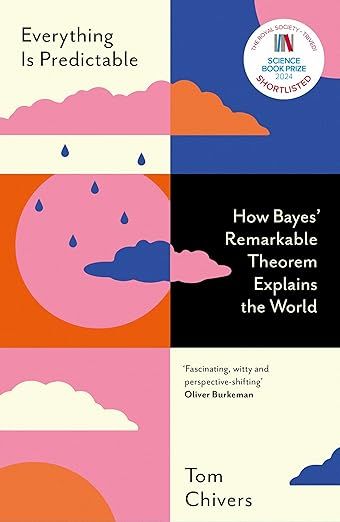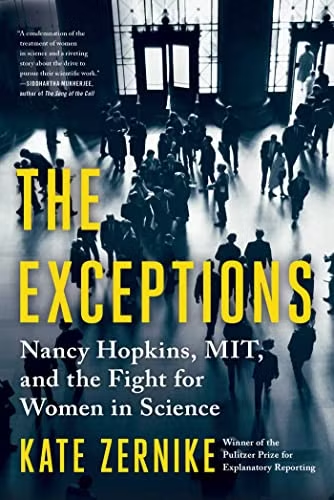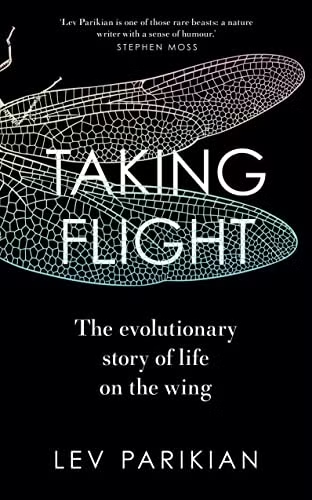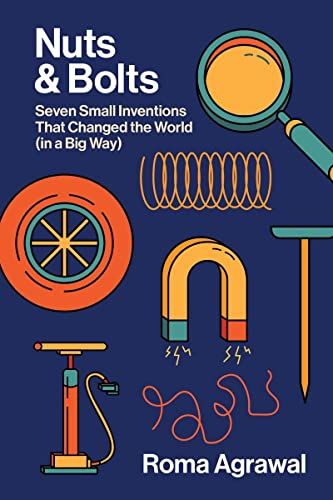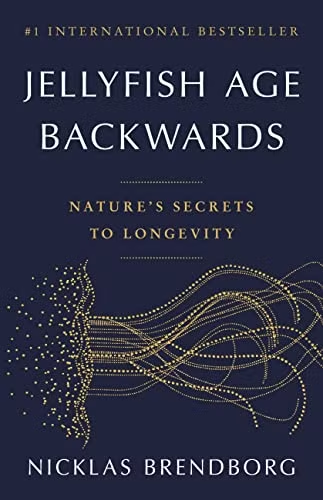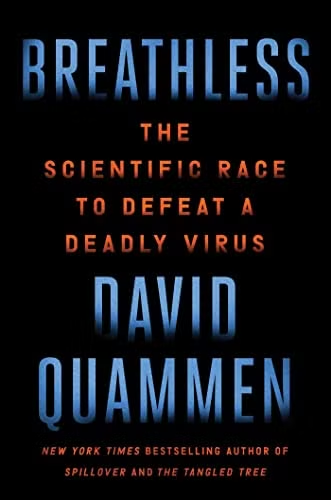New Science Books
Last updated: June 22, 2025
In our new science books section, we keep track of some of the books coming out by Five Books interviewees and frequently recommended authors. It's a golden age for science and science books are following suit, exploring all manner of subjects in an engaging and accessible style for a broad audience. We also are fortunate that the UK's national science academy, the Royal Society (which was founded in 1660 and so still has a wonderfully 17th-century official name: "The Royal Society of London for Improving Natural Knowledge") has two annual book awards, one for adults and one for kids. We try to have the judges take us through the shortlists every year, to ensure those books are also included.
(We also have a separate section dedicated to new math books and new physics books).
A City on Mars: Can We Settle Space, Should We Settle Space, and Have We Really Thought This Through?
by Kelly and Zach Weinersmith
🏆 Winner of the 2024 Royal Society Trivedi Science Book Prize
“There are two things that are very cool. First, it’s written by a husband-and-wife couple, one of whom is a science writer and the other is a cartoonist. They have pooled their talents to write a really engaging, fun narrative that ties together a huge array of multidisciplinary lines of evidence of what it would take to achieve different stages of living in space.” Read more...
“It’s about the neglect of the importance of female anatomy and physiology in our understanding of mammalian evolution, and much more broadly in society. It walks through the evolution of the female form, showing how massive those changes were in terms of their effect on the biology of our distant ancestors, which then affected all descendant mammals in certain ways. Bohannon then marches through the evolutionary tree, through different ancestors (or their proxies), ultimately to us—explaining how our biology as a species, not just as women, has been shaped by the influence of female biology.” Read more...
“Ramakrishnan puts together all the evidence we have about the molecular and cellular biology of ageing and of cancer—and how this relates to mortality, and makes a very interesting point that I had never thought about, which is that there is a tension in the way our cells work in holding off ageing, but also holding off cancer. The two work at loggerheads; you don’t want to get cancer, but also you don’t want your cells to grow too old and to get too damaged to function. Preventing one can enable the other.” Read more...
“A lovely book about the moon by science writer Rebecca Boyle: Our Moon: A Human History. She looks at the moon from all sorts of interesting angles: how it affected the outcome of battles, what it was like for the Apollo astronauts, etc.” Read more...
Nonfiction Books to Look Out for in Early 2024
Sophie Roell, Journalist
“David Baker, whose field is ‘big history’, takes on The Shortest History of Sex, starting with the Big Bang. This is really a fascinating science book, a tale of the entire history (and a bit of the future) of humanity told through the lens of sex. Like On The Origin of Species, each chapter begins with a little summary of the main topics covered. If you’re on the prudish side (I’m afraid I am) the jokes can be a little jarring but given the subject matter, I can understand the author’s decision to go for it.” Read more...
Nonfiction Books to Look Out for in Early 2024
Sophie Roell, Journalist
Third Millennium Thinking: Creating Sense in a World of Nonsense
Saul Perlmutter, Robert MacCoun and John Campbell
🎯 A bestselling book on Five Books in 2024
“According to Nigel Warburton, it’s “a clear, accessible and enlightening guide to the tools of thinking that make science work. It’s a really enjoyable read and a great book for anyone who wants to think more clearly about evidence, argument, reason and the need for a degree of intellectual humility.” “ Read more...
Nonfiction Books to Look Out for in Early 2024
Sophie Roell, Journalist
“Data scientist Hannah Ritchie, head of research at Our World in Data, has a book out on climate change entitled Not the End of the World. Ritchie says she’s inspired by the late Swedish epidemiologist Hans Rosling (author of Factfulness) and the book is very much in the vein of ‘we’ve achieved a lot, let’s not despair.’ It’s a climate-change pep talk, I suppose, but based on facts and data.” Read more...
Nonfiction Books to Look Out for in Early 2024
Sophie Roell, Journalist
“The Globe: How the Earth Became Round by James Hannam looks at how human beings figured out the Earth was round, a nice read for those of us who are still impressed by that feat. Hannam points out the extent to which people misunderstand the history, including Barack Obama in a speech. As he writes, ‘The truth is that, after AD 800, we don’t know of anyone in western Europe with a modicum of literacy who didn’t think that the Earth is spherical.'” Read more...
Notable Nonfiction of Fall 2023
Sophie Roell, Journalist
“Reading the book was the first time I understood properly what calculus was about, by reading how it was developed, step by step. What they have managed to do is to give mathematics a narrative history that can be understood by non-mathematicians, and this requires a lot of skill. There’s a wonderful phrase they use at some point in the book: ‘Mathematics is a relay’. They bring out very fluently the ways in which the baton is passed on.” Read more...
The 2024 British Academy Book Prize for Global Cultural Understanding
Charles Tripp, Political Scientist
“Finally, I’d like to mention a book by a friend, Caspar Henderson, whose latest book, A Book of Noises: Notes on the Auraculous, is about sound. It’s a science book, but it’s also a book about appreciating nature and life. It’s beautifully, beautifully done. ‘For me, writing this book has been part of an attempt to listen more deeply and hold on to a sense of aliveness,’ Caspar writes. You can also read his interview with our deputy editor, Cal Flyn, who spoke to him about books on sound in all its manifestations.” Read more...
Notable Nonfiction of Fall 2023
Sophie Roell, Journalist
“In Oxford University Press’s Very Short Introduction series there’s a new book on Pseudoscience (again, a popular subject subject on Five Books) by Princeton historian of science Michael Gordin.” Read more...
Notable Nonfiction of Early Summer 2023
Sophie Roell, Journalist
“Also in new science books is Cambridge physicist Athene Donald’s Not Just for the Boys: Why We Need More Women in Science, looking at why after decades of effort, the numbers of women pursuing careers in the physical sciences and engineering still remain low, and women aren’t adequately represented at the top of biomedical research either.” Read more...
Notable Nonfiction of Early Summer 2023
Sophie Roell, Journalist
The Possibility of Life: Science, Imagination, and Our Quest for Kinship in the Cosmos
by Jaime Green
Science journalist Jaime Green tells the history of our quest for intelligent life in the universe, exploring the complex science and the science fiction that helps us picture what we might find—and what that might means for humanity.
Worlds Without End: Exoplanets, Habitability, and the Future of Humanity
Worlds Without End by Chris Impey, a professor of astronomy at the University of Arizona, is an accessible and highly readable introduction to exoplanets and the possibility of finding other life in the universe. We're taken through the discovery of exoplanets, the telescopes and technology used, the arguments for life beyond Earth and where science is at in terms of finding it. If you're new to the subject, it's a fun way to learn a lot.
“It’s a good primer. It’s not that short a book, actually, but it’s written in a very nice, concise way…Joshua Winn is part of the TESS team and it’s always interesting to hear about a subject from someone in the field who is at the top of their game. The book is also organized extremely well. He just leads you through the subject in what seems like a logical, sensible way.” Read more...
Chris Impey, Scientist
Radical by Nature: The Revolutionary Life of Alfred Russel Wallace
by James Costa
Radical by Nature is a biography of Alfred Russel Wallace (1823-1913), the English naturalist who came up with the idea of 'transmutation' (now called evolution) at the same time as Charles Darwin, pushing the latter to publish On the Origin of Species in 1859. It's by James Costa, a Professor of Evolutionary Biology at Western Carolina University, who describes Wallace as "one of the great Victorian naturalist explorers." At 416 pages, this is a serious biography that examines Wallace's life and voyages of scientific discovery, his relationship with Darwin, his work on social causes and his spiritual turn which was so at odds with his scientific reputation.
Remnants of Ancient Life: The New Science of Old Fossils
by Dale E. Greenwalt
Remnants of Ancient Life: The New Science of Old Fossils is a really interesting look at advances in paleobiology by Dale Greenwalt, a paleobiologist who curates the fossil insect collection at the Smithsonian Institution’s National Museum of Natural History. While traditional paleobiology had to rely on the study of bones and teeth, paleobiologists can now use ancient molecules to study DNA, protein, pigments, and other organic materials. The shadow of Jurassic Park lurks behind this book: it opens with a description of the discovery of the fossil of a blood-engorged mosquito, a stunning 46 million years old.
Virtual You: How Building Your Digital Twin Will Revolutionize Medicine and Change Your Life
by Peter Coveney & Roger Highfield
Virtual You is by Peter Coveney, Director of the Centre for Computational Science at University College London and Roger Highfield, a science communicator and director at the Science Museum Group. In trying to figure out where we're at in terms of making digital copies of our individual human bodies (a big help as we go into an age of more personalized medicine), we also find out an awful lot about those bodies.
A Traveler’s Guide to the Stars
by Les Johnson
A Traveler’s Guide to the Stars is a nonfiction book about interstellar travel by Les Johnson, who works on propulsion technologies at NASA, though not currently on interstellar travel, which remains well beyond the realms of today's technologies. As he points out, "the nearest star, Proxima Centauri, is about 4.2 light years away." Still, who knows what the future will bring? As he also notes, until the early 1990s the only planets we knew were those going around the sun. It's a nice account of where we are and what the future could hold, though there's no need to pack your bags yet.
The Biggest Ideas in the Universe: Space, Time and Motion
by Sean Carroll
The Biggest Ideas in the Universe by Sean Carroll is a book with a brilliant premise: that it is possible to write a popular science book that introduces the general reader to the "real stuff" of physics—in other words, equations. The book starts with the equation for momentum (p=mv) and goes all the way to general relativity (Rμν − ½Rgμν = 8πGTμν). It's a bold endeavour, and we can't yet confirm whether it's successful at taking the beginner-in-physics reader the whole way. However, it's nicely mixed with titbits from the history of physics—for example, that it was Ibn Sina (Avicenna), the Persian polymath, who first proposed the key idea that in the vacuum of empty space, with no air resistance, a moving body would keep moving forever.
Anaximander and the Nature of Science
by Carlo Rovelli
Carlo Rovelli is a theoretical physicist who is brilliant at explaining his field in short books. Anaximander is about a philosopher who lived 26 centuries ago in Miletus, a Greek city on the coast of what is now Turkey. He was the first person to understand that the Earth is just floating in space, and doesn't need to be supported by anything. Anaximander also figured out where rain comes from. "I think it's my best book because it's about what I think science is," Rovelli said at an event at the annual Oxford Literary Festival on 20 January, 2023.
How the Universe Got Its Spots: Diary of a Finite Time in a Finite Space
by Janna Levin
***A new edition of How the Universe Got Its Spots by Americal theoretical cosmologist Janna Levin***
“There’s not another book out there like it. It is truly unique. I read it when I was a postdoc. I read a lot of popular science, but I read this book and thought, ‘this is an entirely different genre of science writing!’ It’s very personal. She interweaves stories about her science and her science research from a first-person perspective with stuff going on in her personal life— her troubles with her relationship or when she feels depressed or lonely. That’s all in the book. You understand more what it is like to be a human being doing science from this book than anything I’ve ever read. I still think it’s profound. I occasionally go back and reread a chapter of it, also just to be inspired as a writer.” Read more...
The Best Books on the Big Bang
Dan Hooper, Physicist
“It really is an absolutely marvelous read, from start to finish. It’s just very intriguing. It focuses on animal senses—including smell, sight, hearing, and echolocation, among others. It’s written in a way that truly defines what a great science book is, in that it takes a topic and describes it in a clear scientific manner, but also in a way that really makes the reader think. It really makes you think about all the different senses and all these animals with their amazing senses all around us. The book opens up the reader to a whole new world. As humans, we use sight as our main sense to interpret the world around us. But for dogs, for example, their main sense is smell. Learning how a dog, and all the other animals discussed in the book, interpret the world around them was truly intriguing. I also learned about animals that I’d never heard about before. I learned about the star-nosed mole and the fire-chaser beetle, which is really quite amazing. Fire-chaser beetles sense forest fires from miles away and go there to lay their eggs. I really went ‘Wow!’ learning about that. After finishing the book, I felt I had a new appreciation for the world around me and all the species of animals that inhabit it. It really made me think and understand that we are not the only ones here. It’s quite special.” Read more...
The Best Science Books of 2023: The Royal Society Book Prize
Rebecca Henry, Scientist
“It challenges our assumptions…It’s really nice to read an account of scientific endeavor which tells you that across cultures and places, things were going on that gave insight into the world. For example, there’s the astronomer, Ulugh Beg, who five centuries ago calculated the length of the solar year to within 25 seconds of accuracy to what we’ve got today. That single episode encapsulates what this book is about. It encourages us to stop imagining that we are somehow at the center of the universe of progress and development and to recognize that there are other cultures out there who have been way ahead of the game and who we’ve learned from…The book is very accessible…I really appreciate a scientist helping me to understand scientific developments in a way that absolutely resonates and unpeels the complexities of our world. It’s a very significant book.” Read more...
The British Academy Book Prize: 2022 Shortlist
Philippe Sands, Lawyer
“Existential Physics is by Sabine Hossenfelder, a German theoretical physicist and physics popularizer, and is her take on some of the big questions. The book was not easy for me—I had to reread parts—but I loved the opening lines, based on a young man’s question to her. He asked: ‘A shaman told me that my grandmother is still alive. Because of quantum mechanics. She is just not alive here and now. Is this right?’ And Hossenfelder’s response, addressed to the reader: ‘As you can tell, I am still thinking about this. The brief answer is, it’s not totally wrong.'” Read more...
Nonfiction of 2022: Fall Roundup
Sophie Roell, Journalist
“In Atoms and Ashes, Ukrainian historian Serhii Plokhy, author of a brilliant book on Chernobyl, looks at six nuclear disasters around the world—starting with the testing of a hydrogen bomb in Bikini Atoll in 1954 and ending with Fukushima—to see what lessons can be learned from them. As citizens, the pros and cons of nuclear power is something we have a duty to think about, and this book is a gripping way in.” Read more...
Notable Nonfiction of Spring 2022
Sophie Roell, Journalist
Supernova
by Or Graur
In his book Supernova Or Graur, Senior Lecturer in Astrophysics at the Institute of Cosmology and Gravitation at the University of Portsmouth, introduces his field. Graur does research on Type Ia supernovae but has also spent a lot of time doing public education and outreach, including working with high school students. The book is interesting, informative and very clear. It makes you want to go out and look at the night sky.
“Humans do science, that that means it’s flawed, you know? Maybe they over-hype their findings, sometimes they are biased in their analysis or data collection. He gives several well-known examples—Andrew Wakefield’s MMR paper, or Paolo Macchiarini’s work on transplantation. He reaffirms what science should be about—nullius in verba, take nobody’s word. Which is in fact the Royal Society’s motto. He comes up with ways to limit the damage to science, which makes it quite an important book because you want to ensure science is done to the highest possible standard.” Read more...
The Best Popular Science Books of 2021: The Royal Society Book Prize
Luke O'Neill, Scientist
“This is a bit like a detective story. O’Sullvan is a neurologist, who specialises in epilepsy. Some of the patients she would see have these strange seizures, that’s how she got into it, I suppose. In the book, she goes around the world to explore these examples of young women who have gone, suddenly, into comas, and cannot be raised. Or they’ve developed epilepsy suddenly. She goes to Sweden, upstate New York, Kazakhstan, and then characterises them all. It’s a good clinical account of our most unusual situations—which aren’t as uncommon as you might think.” Read more...
The Best Popular Science Books of 2021: The Royal Society Book Prize
Luke O'Neill, Scientist
“Imagine a whole book about breathing! But there was a necessity, I think. Nestor is a journalist; he goes into everything you need to know about breathing. We learn that no matter what you eat, no matter how you exercise, how wise you are—none of it really matters if you’re not breathing properly.” Read more...
The Best Popular Science Books of 2021: The Royal Society Book Prize
Luke O'Neill, Scientist
“It’s by a female astronomer in a very male-dominated science, historically. She describes her own career, and how she navigated that world. She gives a really good account of the telescopes in Chile and Hawaii—all the challenges, all the things that broke down, bad weather, all sorts—and goes into detail on the great discoveries astronomers have made. Towards the end, she talks about the future of astronomy: now you can do it all remotely, just download data from the telescope. She makes a compelling case of how the science will change because of this.” Read more...
The Best Popular Science Books of 2021: The Royal Society Book Prize
Luke O'Neill, Scientist
Lady Sapiens: Breaking Stereotypes About Prehistoric Women
by Eric Pincas, Jennifer Kerner & Thomas Cirotteau
Lady Sapiens is a nonfiction book, translated from French, that offers a great introduction to what we know about women who lived during the Upper Paleolithic period (40,000 to 10,000 years ago). The authors report on what the latest science says about our human ancestors in a clear, no-nonsense way and you learn a lot from reading it. The book is also very nicely illustrated.
Vaxxers: The Inside Story of the Oxford AstraZeneca Vaccine and the Race Against the Virus
by Catherine Green & Sarah Gilbert
Vaxxers is a book by two scientists at the University of Oxford who, with their team, developed the AstraZeneca vaccine against Covid-19. Professor Catherine Green heads the Nuffield Department of Medicine's Clinical Biomanufacturing Facility and Sarah Gilbert is Professor of Vaccinology. Behind the impressive titles and incredible achievement, it's the story of two scientists working flat out and what it was like on a day-to-day basis—scientifically, practically and emotionally.
The title is telling: this is a book written with anti-vaxxers in mind, outlining what it is that vaxxers do, or did in the case of this particular vaccine. The writing of the book was prompted by a campsite encounter Green had with an anti-vaxxer, who had told her, "I'm not saying there is definitely a conspiracy...but I do worry that we don't know what they put in these vaccines: mercury and other toxic chemicals. I don't trust them. They don't tell the truth." Green had to tell her, "I am 'them': and, appropriately, at the end of the book all the ingredients of the Oxford AstraZeneca vaccine are listed.
I am a book. I am a portal to the universe.
by Stefanie Posavec & Miriam Quick (illustrator)
🏆 2021 Royal Society Young People’s Books Prize
“My very favourite of the books. In fact, I liked it so much that I bought fifteen copies and I’ve been giving them out to everyone…. I wasn’t the only one who loved this book. I think everyone was intrigued by it, because it’s so interactive. It’s a true and very creative art and science fusion.” Read more...
Best Science Books for Children: the 2021 Royal Society Young People’s Book Prize
Katharine Cashman, Scientist
The Next 500 Years: Engineering Life to Reach New Worlds
by Christopher Mason
Have you ever worried about what will happen 4.7 billion years from now, when the Earth is so close to the Sun that we won't be able to live on it anymore? Or trillions of years from now, when the universe will most likely come to an end? Many of us haven't, but Chris Mason, a geneticist who runs a lab at Weill Cornell Medicine and focuses on the effects living in space has on the body, has. A lot. You can already imagine the blockbuster movie: the hero who saves humanity because he worried about things no one else did. In this book, The Next 500 Years, Mason lays out his plan for leaving our solar system, including the genetic engineering required so our bodies are better adapted to space and the possible transport options for getting there.
We also spoke to Chris about the best space travel science fiction, some of it more science than fiction.
The Code Breaker: Jennifer Doudna, Gene Editing, and the Future of the Human Race
by Walter Isaacson
The Code Breaker is the story of Jennifer Doudna, who won the 2020 Nobel Prize in Chemistry for her development of the CRISPR technology that allows gene editing. It is also the story of genes and gene editing and women in science. Walter Isaacson is a veteran biographer. He writes in highly readable prose that is particularly welcome when it comes to writing about science, when the concepts can be difficult. He also writes it like a pacy story, where you want to know what happens next. It is little surprise that on coming out, The Code Breaker went straight to the top of the New York Times nonfiction bestseller list.
Entangled Life: How Fungi Make Our Worlds, Change Our Minds & Shape Our Futures
by Merlin Sheldrake
***Winner 2021 Wainwright Prize for Writing on Global Conservation***
***Winner The Royal Society Science Book 2021***
“This is an outstanding science book, actually. And again: who would imagine you’d enjoy a doorstopper of a book about fungi? He goes through everything you need to know about fungi: he talks about truffles, about psychedelic mushrooms, about yeast and alcohol, penicillin. He even makes the case that life wouldn’t have to moved onto land without fungi.I thought that was fascinating. So, again, great science and really well written.” Read more...
The Best Popular Science Books of 2021: The Royal Society Book Prize
Luke O'Neill, Scientist
Life's Edge: The Search for What It Means to Be Alive
by Carl Zimmer
Just as many of us are still struggling with the question of the meaning of life, the brilliant popular science writer Carl Zimmer—whose books have been frequently recommended on Five Books—takes the question a step further back and asks what life actually is. This promises to be a fun read on a really important question, not least because the virus wreaking havoc across the planet at the moment is very lively and yet...not alive.
Viruses: A Very Short Introduction
by Dorothy H. Crawford
Part of the Very Short Introductions series
“Viruses are just a piece of genetic material inside a protein shell. So they’re obligate parasites. They can’t exist on their own. Whether or not they are alive is a moot point: it’s something that I’ve argued both for and against in my own books, because it’s an interesting question not only scientifically, but also philosophically. You have to start by asking: what do we call ‘alive’? I would come down on the side of no, they are not living. After all, they don’t metabolise, so they can’t generate energy or make proteins; in fact they can’t do anything on their own. That piece of genetic material has to get inside a living cell – then it hijacks all the mechanisms of the living cell to produce its own offspring.” Read more...
Dorothy H. Crawford, Medical Scientist
Bedeviled: A Shadow History of Demons in Science
by Jimena Canales
When reading key works in the history of science—that story of how we turned from believing that everything that happens around us is the work of gods and supernatural forces to understanding bacteria, gravity etc—historian of science Jimena Canales noticed how often 'demons' made an appearance. Bedeviled is her exploration of—and reflections on—that contradiction, starting in the 17th century with René Descartes. This is not a book for beginners, but if you're interested in the history of science and how scientific discoveries are made, it's a really fascinating paradox that she explores.
Nuclear Choices for the Twenty-First Century: A Citizen's Guide
Richard Wolfson and Ferenc Dalnoki-Veress
Nuclear Choices for the Twenty-First Century: A Citizen's Guide is a must-read book if you're interested in anything nuclear. Many people watched the Netflix series about Chernobyl and, for many of us, it was the first time we really started to understand how a nuclear power plant works. This book is a chance to get better educated not just about nuclear power, but every aspect of nuclear, from the basic physics to nuclear weapons and medical technologies. It tries to take a disinterested approach, presenting the pros and cons, so we can each make a decision we're comfortable with about the role of nuclear technology in our societies.
The Human Cosmos
by Jo Marchant
In The Human Cosmos award-winning science writer Jo Marchant tells the history of our relationship with the stars, from our cave-dwelling ancestors to a NASA astronaut walking in space, observing the "velvet bottomless bucket of the universe stretching on forever". The stars have inspired and awed humans throughout history but nowadays not so much, which is a pity.
Quantum Reality: The Quest for the Real Meaning of Quantum Mechanics
by Jim Baggott
Science writer Jim Baggott has devoted his working life to making quantum physics accessible to the rest of us. As he mentions in the preamble, he has been called 'depressingly sane'. He is a strong advocate for a bigger role for philosophy in science, as we reach the limits of what our minds can get our heads around and wild speculation has taken the place of empirical evidence. In this book, he explores the relationship between quantum physics and reality.
A Series of Fortunate Events: Chance and the Making of the Planet, Life, and You
by Sean B Carroll
Sean B Carroll is both a serious biologist and a gifted science communicator, and his books have been recommended several times on Five Books. A Series of Fortunate Events is a an informal, chatty book about the role chance has played in our lives, from the giant asteroid that hit the Yucatan 66 million years ago, to why we get cancer later in life. It's very informative and a lot of fun.
At The Edge of Time
by Dan Hooper
At The Edge of Time by astrophysicist Dan Hooper is a popular science book that explains, in lay person's terms, not only what we know out about the universe to date, but also what we don't know about it. "Right now, there’s a culmination of mysteries in cosmology that need to be told as a coherent story," he says in his Five Books interview on the Big Bang. "Maybe we’re in the 1904 of cosmology right now, and we're going to tear down everything we think we know to the ground and build something entirely new."
“Two British people went to Iceland to find the last of the auks in the 1840s, which were reportedly on an outlying island. Extinction was a known phenomenon, but was thought to be something that happened to inferior species—they were kind of doomed to go extinct anyway, and not by human causes. In this case, through their very careful investigations and oral histories—interviewing people around Iceland who had seen auks or heard about them— as well as looking at the physical evidence, they discovered the great auk had gone extinct. It’s a powerful story of how people who love birds discovered a world-changing perspective on what we can do to the environment—that we, our greed, can destroy a species. That’s a pretty humbling revelation.” Read more...
“This reads like a mystery, although we already know the outcome. This is a work of truly rigorous investigative journalism by the reporter who broke the story about this company, Clearview AI, in The New York Times: how it is using facial recognition in startling new ways, and how it has sold its software to police organisations who are using it to try to identify criminals from videos.” Read more...
“I wish I’d read this book years ago. Bayesian statistics is all over my area of research—and, as the book argues, it’s all over everywhere, and it has long been so. But the general public is not aware of this, and even many scientists, I think, are not aware of Bayes’ theorem. In a way, the book is pretty simple. It’s about one equation, which calculates the probability of something, given a piece of evidence and your confidence in that evidence. There’s a way you go through, calculating the probability of some event, adjusting your calculations as new evidence comes in—and that’s it, really. But the author does a great way of explaining how this is counter-intuitive to a lot of people.” Read more...
“This book is about the life and work of Nancy Hopkins, who is a molecular biology professor in the United States. It focuses on the discrimination that she went through as a young woman scientist in the 1960s and 70s in the United States. It’s specifically focused on MIT/Harvard, because that’s where she did most of her work. This book really struck me on a personal level, reading it and learning about the struggles of women in science…It was really a book that I didn’t want to put down. It’s a very exciting, easy read. It’s written in a very elegant way. There are personal accounts, there are historical aspects and also different scientific aspects all interwoven throughout the chapters…The end is quite topical. The last chapter mentions Katalin Karikó, who is the Hungarian-American scientist whose work on messenger RNA helped pave the way for the COVID-19 vaccine. She worked for years in research institutes in America. She didn’t get tenure, she got fired, she didn’t get equal treatment with men, but she continued to preserve. She now is a recipient of the Nobel Prize in Physiology and Medicine.” Read more...
The Best Science Books of 2023: The Royal Society Book Prize
Rebecca Henry, Scientist
“It’s a book about the evolution of flying. From a scientific point of view, it’s a really interesting topic and the author communicates it in a very educational, but also an entertaining and engaging manner. Each chapter focuses on a different type of bird or flying mammal. For example, there’s one chapter on bats and another on hummingbirds. One interesting thing that I learned about the hummingbird that I didn’t know before, is that it has a hippocampus—the part of the brain that is involved in our ability to store memories—and uses it to remember the flowers with the best pollen. They fly around to the different flowers and memorize which ones are good and which ones less so. The book reminds you that we’re not the only ones here on the planet. There are other animals and creatures out there that are living their lives. As a result of reading this book, I’m more aware of, and will take more time to appreciate, all the flying birds, insects and creatures around us.” Read more...
The Best Science Books of 2023: The Royal Society Book Prize
Rebecca Henry, Scientist
“What she looks at is apparently quite mundane types of engineering developments over the centuries or even millennia. There is one chapter on the nail and another one on the wheel. You think, ‘How am I going to read a chapter about a nail?’ but the author discusses how many objects we use all the time couldn’t actually function without the discovery of the nail. She discusses seven of these engineering developments that we never think about, and makes you as a reader go, ‘Oh, my gosh! Society as we know it would not be the same without these discoveries.’ It was a captivating read…My take-home message is that this is a book that everybody should read if they’re interested in learning about the world around us. For me personally, I feel I have a greater appreciation for these so-called mundane objects that allow us to function in our daily lives.” Read more...
The Best Science Books of 2023: The Royal Society Book Prize
Rebecca Henry, Scientist
“The idea is that when jellyfish are exposed to any type of stressor, they go back to their polyp form, eventually budding again to produce a genetically identical jellyfish. Essentially, they can retreat back to their former self and hide in response to stressors and then regrow again into their adult form when the time is right. This is quite amazing. The author uses this premise to talk about the process of aging. There’s a lot of research going on nowadays, about how we can slow down the aging process and what we can do to advance our lives. It’s great…He really brings in a lot of humor throughout the book as he writes about some of the nonsense science that has been put out there about anti-aging…This book is presented in a very clear manner. It’s a very easy read and introduces the reader to the different advances in research on anti-aging.” Read more...
The Best Science Books of 2023: The Royal Society Book Prize
Rebecca Henry, Scientist
“This is a book about the COVID-19 pandemic, but what makes this read unique is that it doesn’t go into the preparedness of countries or how they dealt with COVID-19. Rather, it takes you on a detective-like journey through the science of COVID-19. It looks at the theories on its origins and the scientists who worked relentlessly on understanding the biology of the virus itself and then the development of the vaccines against it. A lot of people think that the vaccine development happened quite fast, me included. However, in reality, RNA-type vaccine technology has been in the works for years. Scientists have been working on mRNA vaccine technology for decades and were then able to take that technology and effectively apply it to COVID-19.” Read more...
The Best Science Books of 2023: The Royal Society Book Prize
Rebecca Henry, Scientist
-

1
Everything is Predictable: How Bayes’ Remarkable Theorem Explains the World
by Tom Chivers -

2
Eve: How The Female Body Drove 200 Million Years of Human Evolution
by Cat Bohannon -

3
Your Face Belongs to Us: The Secretive Startup Dismantling Your Privacy
by Kashmir Hill -

4
The Last of Its Kind: The Search for the Great Auk and the Discovery of Extinction
by Gísli Pálsson -

5
Why We Die: The New Science of Aging and the Quest for Immortality
by Venki Ramakrishnan -

6
A City on Mars: Can We Settle Space, Should We Settle Space, and Have We Really Thought This Through?
by Kelly and Zach Weinersmith
The Best Popular Science Books of 2024, recommended by John Hutchinson
The Best Popular Science Books of 2024, recommended by John Hutchinson
Every year, the judges of the Royal Society Science Book Prize put together a shortlist of the smartest, sharpest, funniest science books of the previous twelve months. We asked the chair of the 2024 panel—the leading evolutionary biomechanics researcher Professor John Hutchinson—to talk us through their picks of the best new popular science books.
-

1
An Immense World: How Animal Senses Reveal the Hidden Realms Around Us
by Ed Yong -

2
Breathless: The Scientific Race to Defeat a Deadly Virus
by David Quammen -

3
Jellyfish Age Backwards: Nature's Secrets to Longevity
by Nicklas Brendborg -

4
Nuts and Bolts: Seven Small Inventions That Changed the World in a Big Way
by Roma Agrawal -

5
Taking Flight: The Evolutionary Story of Life on the Wing
by Lev Parikian -

6
The Exceptions: Nancy Hopkins, MIT, and the Fight for Women in Science
by Kate Zernike
The Best Science Books of 2023: The Royal Society Book Prize, recommended by Rebecca Henry
The Best Science Books of 2023: The Royal Society Book Prize, recommended by Rebecca Henry
The Royal Society, set up in the 1660s, is a fellowship of some of the world’s most eminent scientists. It also has an annual book prize, celebrating the best popular science writing. Neuroscientist Rebecca Henry, one of this year’s judges, talks us through the fabulous books that made the 2023 shortlist—and explains how good science writing can change the way you see the world around you.
